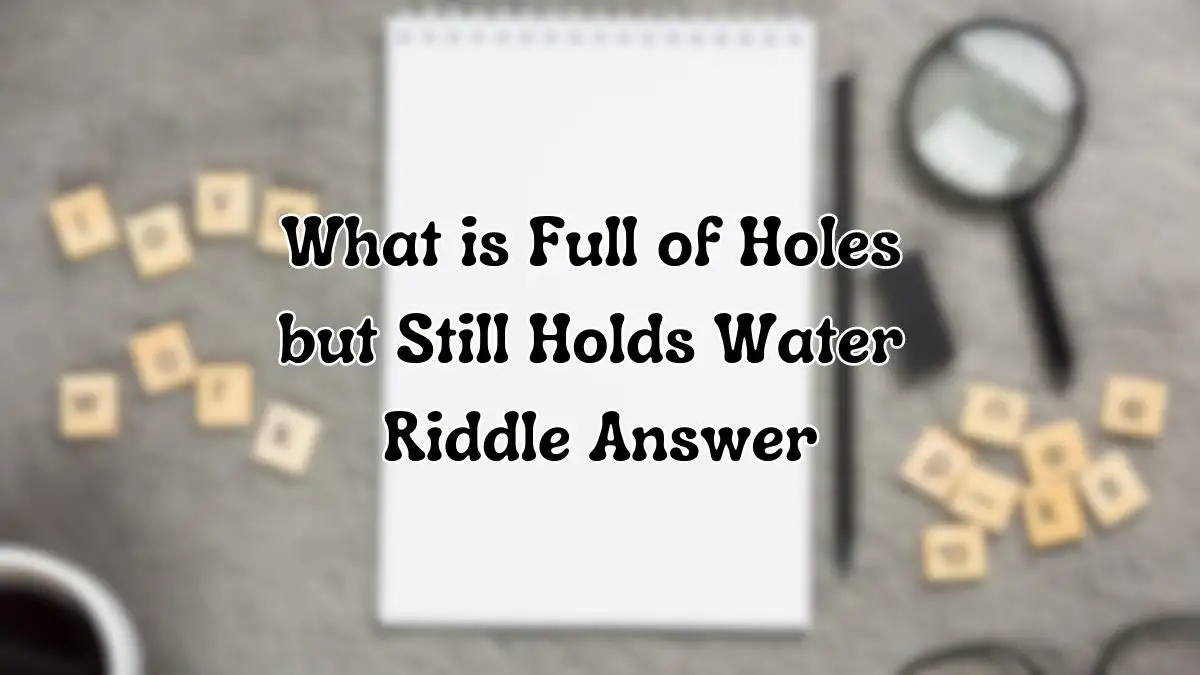What is Full of Holes but Still Holds Water Riddle Answer and Explanation
by Madhumitha
Updated Sep 18, 2024

What is Full of Holes but Still Holds Water Riddle
What is Full of Holes but Still Holds Water Riddle, challenges you to think about an object that has numerous openings or gaps, yet still manages to retain a liquid. Consider everyday items with perforations or porous structures.
The key is to identify something that, despite these holes, is designed to hold or contain water effectively. Think about common objects that fit this description and how their design allows them to serve their purpose despite having holes.
What is Full of Holes but Still Holds Water Riddle Answer
The Answer to the Riddle "What is Full of Holes but Still Holds Water" is Sponge.
Answer Explanation
The answer to the riddle "What is full of holes but still holds water?" is a sponge. A sponge is full of tiny holes or pores, but it can still hold a lot of water. The holes in the sponge create a network that traps and absorbs water, allowing it to hold a significant amount despite its porous nature. So, while the sponge is indeed full of holes, its structure is designed to soak up and retain water efficiently.
What are Riddles?
Riddles are questions or statements designed to challenge your thinking and problem-solving skills. They often have a hidden or clever answer that requires creative or lateral thinking to uncover. The purpose of riddles is to entertain and engage people by making them think outside the box and use their imagination.
In essence, riddles use wordplay, ambiguity, or logic puzzles to create a mental challenge. The answer to a riddle is typically not straightforward and can involve interpreting the question in an unexpected way. Riddles are popular in various cultures and are often used in games, literature, and as a form of intellectual exercise.
Recent Articles
- Puzzle IQ Test: Only 5 Out of 10 Can Spot the 5 Hidden Words in this Image in 10 Secs
- Optical Illusion Eye Test: If You have Hawk Eyes Spot the Odd Flower in 5 Secs
- Odd One Out Puzzle: Only eagle Eyes Can Spot the Odd Elephant in 7 Secs
- Optical Illusion Eye Test: If You have Hawk Eyes Spot the Odd Grapes in 7 Secs
- Puzzle IQ Test: Only 5 Out of 10 Can Spot the 5 Hidden Words in this Image in 10 Secs
- Optical Illusion Eye Test: If You have Hawk Eyes Spot the Odd Baby in 7 Secs
- Odd One Out Puzzle: Only eagle Eyes Can Spot the Odd Sunflower in 7 Secs
- Optical Illusion Eye Test: If You have Hawk Eyes Spot the Odd Turtle in 5 Secs
- Puzzle IQ Test: Only 5 Out of 10 Can Spot the 5 Hidden Words in this Image in 10 Secs
- Optical Illusion Eye Test: If You have Hawk Eyes Spot the Odd Ball in 7 Secs
- Odd One Out Puzzle: Only eagle Eyes Can Spot the Odd Watermelon in 7 Secs
- Optical Illusion Eye Test: If You have Hawk Eyes Spot the Odd Skunk in 7 Secs
- Puzzle IQ Test: Only 5 Out of 10 Can Spot the 5 Hidden Words in this Image in 10 Secs
- Optical Illusion Eye Test: If You have Hawk Eyes Spot the Odd Dog in 7 Secs
- Odd One Out Puzzle: Only eagle Eyes Can Spot the Odd Elephant in 5 Secs
- Optical Illusion Eye Test: If You have Hawk Eyes Spot the Odd Cherry in 5 Secs
- Puzzle IQ Test: Only 5 Out of 10 Can Spot the 5 Hidden Words in this Image in 10 Secs
- Optical Illusion Eye Test: If You have Hawk Eyes Spot the Odd Cat in 7 Secs
- Optical Illusion Eye Test: If You have Hawk Eyes Spot the Odd Cupcake in 5 Secs
- Odd One Out Puzzle: Only eagle Eyes Can Spot the Odd Mango in 5 Secs
- Optical Illusion Eye Test: If You have Hawk Eyes Spot the Odd Apple in 5 Secs
- Odd One Out Puzzle: Only eagle Eyes Can Spot the Odd Teddy Bear in 5 Secs
- Puzzle IQ Test: Only 5 Out of 10 Can Spot the 5 Hidden Words in this Image in 10 Secs
- Optical Illusion Eye Test: If You have Hawk Eyes Spot the Odd Hen in 5 Secs
- Puzzle IQ Test: Only 5 Out of 10 Can Spot the 5 Hidden Words in this Image in 10 Secs




